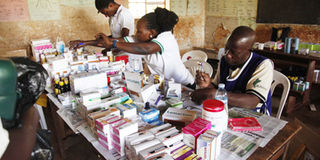Uganda spends Shs1.6 trillion to import drugs

Large import bill. Uganda has about nine pharmacutical factories but still imports most of its drugs. PHOTO BY RACHEL MABALA
What you need to know:
- Rising. The import bill has been rising despite establishing nine pharmacutical factories in the last 15 years.
Kampala.
Uganda spends $450m (Shs1.6 trillion) on pharmaceutical imports annually.
This was revealed during the Third United Kingdom East Africa Health Investment Conference in Kampala at the weekend.
The import bill in Uganda’s health sector has been growing despite establishing nine pharmaceutical factories in the last 15 years.
The Uganda health sector is estimated to be worth about $1.028b and receivies enormous support from UK since 2013 channeled through Uganda-UK Health Alliance.
Speaking at the conference, Peter West, the British High Commissioner to Uganda, said the private sector was crucial to the development of Uganda’s health sector, urging the private players to invest in health in order to cut back on the increasingly growing import bill.
“I know the British business delegation are keen to explore investment opportunities and to contribute to the sector’s development,” he said, adding that his government will in the next five years invest about £83m (Shs423b) to support improvements in health outcomes.
Dr Sam Orach, the head of the Uganda Catholic Medical Bureau, urged the private sector to invest in the health sector to supplement government efforts.
“Improving the health sector is not a government job alone. This [investment] will reduce the cost of health services and save the country from a huge import bill,” he said.
The conference, which was organised by the UK Department for International Trade, Ministry of Health, Barclays Bank, Prudential and Cipla Quality Chemicals, also discussed other key areas including health infrastructure, access to equipment, medical products supply and insurance.
Mr Rakesh Jha, the Barclays Bank managing director, said their shared focus to promote Uganda’s the health sector has ensured that the bank commits more than $20m (Shs73.2b).
In 2013, The National Policy on Public-Private Partnership in the health sector was approved with key focus on improving access to equity, efficiency, quality and building a sustainable health care system.
Currently, more than 75 per cent of private-not-for-profit providers belong to religious institutions and the rest are run by non-governmental organisations or foundations.
They include the facility-based providers, which offer preventive and curative care including highly specialised services and the non-facility-based which offer preventive, rehabilitative, and palliative care.


